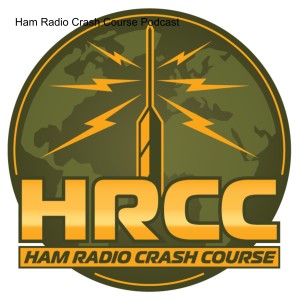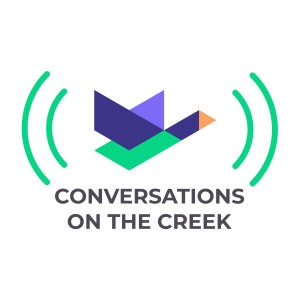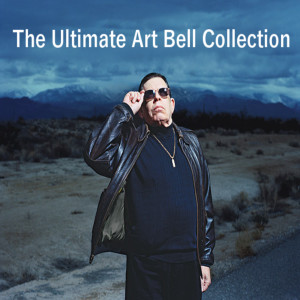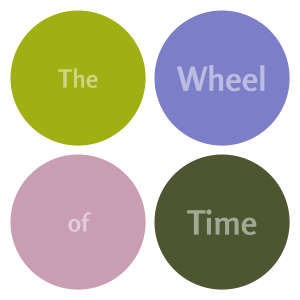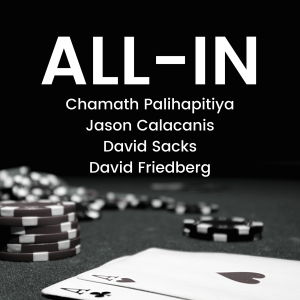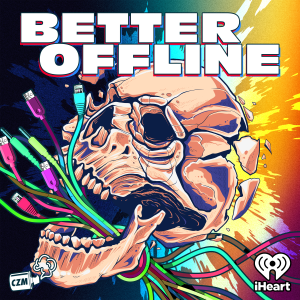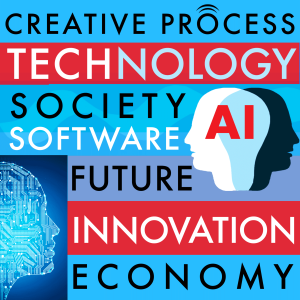

Tech, Innovation & Society - The Creative Process: Technology, AI, Software, Future, Economy, Science, Engineering & Robotics Interviews
https://thecreativeprocess.squarespace.com/technology-innovation-society?format=rssEpisode List

Can Finance Revolutionize Climate Action? with MARK CAMPANALE, Founder of Carbon Tracker
“Carbon Tracker is a non-profit financial think tank focused on change and the energy transition. I set it up because I spent 20 years working in the financial world, and I noticed that a lot of coal, oil, and gas projects, even with all the evidence we know about climate change, were getting financed through banks and the stock market. It was almost as if investors were completely disregarding what climate change was going to do within our lifetime. What I wanted to do was challenge that, challenge the way people think, and challenge the financial operators, the bankers, stock exchange regulators, and investors to think about what climate change was going to do and what we could do about it. We're saying to the owners of these companies, the shareholders, ‘Why don't you think about what the world will look like in 50 years, and why are you putting these young people's pensions into coal, which we know is going to destroy the planet?’ ”For decades, the conversation around climate change often felt abstract, a distant threat. But what happens when that threat collides with the very concrete world of finance, with investments, and with the bottom line? Mark Campanale has been at the forefront of this critical intersection for over two decades. He's a veteran of sustainable finance, having helped launch some of the earliest responsible investment funds. But it's his work with the Carbon Tracker Initiative that has truly reshaped how we understand the economic risks of a fossil fuel-dependent future. Carbon Tracker, an independent financial think tank, introduced concepts like the "carbon bubble" and "stranded assets"—terms that have not only become central to the divestment movement but are now indispensable for investors and regulators trying to navigate the path to decarbonization. Mark Campanale and the Carbon Tracker Initiative have made it impossible to ignore the financial implications of a warming planet.Episode Websitewww.creativeprocess.info/podInstagram:@creativeprocesspodcast

Abolish Silicon Valley—How to Liberate Technology from Capitalism
“Abolishing Silicon Valley means freeing the development of technology from a system that will always relegate it to a subordinate role, that of entrenching existing power relations. It means designing a new system that isn't deluged in the logic of the bucket. It means liberating our worlds from the illegitimate ring of capital. Perhaps this sounds unfair to capital. Perhaps I sound like I'm not grateful enough for everything that capital has given us, but we don't owe capital anything; the things we attribute to capital were built by workers.People can labor and sometimes die in a process. Their contributions are unrecognized in death as in life. So don't thank capital. It doesn't deserve our gratitude, and it doesn't need it. Thank the people who created everything that capital always takes credit for. Capital is a means of accounting for wealth ownership, not its creation. And that means it's perpetually shrouded in a fundamental untruth; we can leap the swamp of capital behind and start over with something new. “In this episode on Speaking Out of Place podcast Professor David Palumbo-Liu talks with Wendy Liu. Ever since its publication, Abolish Silicon Valley—How to Liberate Technology from Capitalism has proven to be more urgent and insightful. Today, he talks with author Wendy Liu about how developments like AI and LLM, further erosions of intellectual property, and increased invasions of privacy make the case for abolishing Silicon Valley even more important. They talk about how abolition is critical at a time when more and more the private sector has come to eviscerate the public good. Turning to the genocide in Gaza, they discuss the ways Capital has enlisted technology in deadly and horrific manners. They end with a meditation on the commons and how one can live with fewer commodities and find value in common projects to make life more valuable and worthwhile outside of the logic of the market.Wendy Liu is the author of Abolish Silicon Valley: How to Liberate Technology From Capitalism, a memoir/manifesto about the tech industry from the perspective of a former believer. She lives in San Francisco and is working on a novel.www.palumbo-liu.comhttps://speakingoutofplace.comBluesky @palumboliu.bsky.socialInstagram @speaking_out_of_place

Life As No One Knows It - Exploring AIR Aspen with NICOLA LEES - Highlights
“For us, I think it really is about trust and commitments, and I don't think that has necessarily changed over the years. As we work on that, obviously, we are very much invested in how we can engage an audience and spark the curiosity that people are looking for. The most important thing often is how we can spark that curiosity in ourselves. As a way of working, which I think is the most important framework for an institution, the institution should constantly want to learn and evolve, and it isn't a static place. Particularly coming from the opportunity of not being a collecting institution, we are ever-evolving and ever-changing.”Nicola Lees is truly pushing the boundaries of what a museum can be. Since 2020, she has been director of the Aspen Art Museum, a non-collecting, artist-founded institution dedicated to experimentation and supporting the most innovative voices in contemporary art. Under her direction, the AAM has just unveiled an ambitious, decade-long initiative called AIR Aspen. From July 26–August 1, 2025, AIR isn't just another program; it's the first artist-led global summit, a bold undertaking that will bring together artists, cultural leaders, policymakers, and influencers for yearly talks, performances, workshops, and an annual retreat. It’s designed to explore the profound role of art in addressing the big questions of our time, from AI to how we relate to one another. The inaugural theme, "Life As No One Knows It," promises to be a deeply engaging exploration of what it means to be alive in an era of rapid technological and environmental change, and it will feature an extraordinary roster of creatives whose work transcends traditional disciplines, including Francis Kéré, Paul Chan, Aria Dean, Glenn Ligon, and Maya Lin.Before her tenure in Aspen, Nicola Lees made her mark as the director and curator of New York University’s 80WSE and as a curator for Frieze Projects at Frieze London. Today, we’ll delve into her philosophy of art, leadership, and the transformative power of this new initiative.Episode Websitewww.creativeprocess.info/podInstagram:@creativeprocesspodcast

Writing, AI & The Future of Humanity w/ VIET THANH NGUYEN
“As a writer, I do believe that art and literature in and of themselves are important. I'm going to keep on writing novels, and one of the most important reasons why is because, as you mentioned, language is crucial. Part of the way that states and authoritarian regimes exercise their power is not just through physical violence and intimidation, but through a maltreatment of language itself. Trump is a perfect example of this. Everything that comes out of his mouth in terms of language is horrifying for anybody with any sensitivity to language. The excesses of his language in terms of insults and hyperbolic praise for his fans are perfect examples of how language is used by an authoritarian and by the state to obfuscate reality and intimidate people. That language is ugly from my perspective, and there is something about being committed to literature and to art that awakens us to the importance of beauty.I think about what John Keats, the poet, said: beauty is truth, truth beauty. You can't separate these kinds of things. If you're committed to the beauty of language, you're also committed to the idea that language has a relationship to truth. You can see that authoritarians don't have a relationship to truth. They have a relationship to the abuse of truth and to lying, not only in content but in the form of their language as well. There is a crucial role for writers here in our relationship to language because language is one of the most crucial ways that authoritarianism extends its power. What I've discovered as a writer is that fear is a good indicator that there is a truth. To speak the truth in a society is oftentimes an act that requires some courage.”Viet Thanh Nguyen has spent much of his life exploring the stories we tell—and the stories we erase—about war, migration, and memory. His 2015 debut novel The Sympathizer, about a communist double agent in the aftermath of the Vietnam War, won the Pulitzer Prize and a long list of other major literary awards. In 2024, The Sympathizer was adapted into a critically acclaimed HBO series directed by Park Chan-wook.He followed it with The Committed, and his latest work, To Save and to Destroy: Writing as an Other, a meditation on writing, power, and the politics of representation.Nguyen is also the author of Nothing Ever Dies, a finalist for the National Book Award in nonfiction, and the short story collection The Refugees. He’s edited collections like The Displaced: Refugee Writers on Refugee Lives, and most recently the Library of America volume for Maxine Hong Kingston, who was once his teacher.He was born in Vietnam, came to the U.S. as a refugee, and is now a professor at the University of Southern California. He’s received Guggenheim and MacArthur fellowships, honorary doctorates, and has been named a Chevalier by the French Ministry of Culture. Today, we’ll talk about his books, America’s forever wars, and how the act of writing—across fiction, memoir, and scholarship—can become both a form of resistance and a way of making sense of being, as he puts it in his memoir “A Man of Two Faces.”Episode Websitewww.creativeprocess.info/podInstagram:@creativeprocesspodcast

The First Artist-Led Global Summit & The Future of Museums - NICOLA LEES, Director, Aspen Art Museum
“It's a complicated time to think about how we can slow down, be still, and bring a brilliant group of people together to do something that feels purposeful and can be productive. It's a moment where things are moving so fast. When I brought up the idea of a hinge generation, I think it's impossible to know how we will look back and reflect on this time and these moments. We are very invested in enabling people to build new relationships. What we've found from these past gatherings in Aspen is that those are the things people still talk about from 40, 50, or 60 years ago. You were also asking about a relationship with the environment. I think Maya Lin, who is coming to give a keynote lecture, is someone who is very invested in that conversation. We are also working with the Serpentine Gallery and Hans Ulrich Obrist on the keynote lectures. Francis Kéré is also coming to talk about the sustainability of his architectural practice and how that navigates the world differently. We're also working with Storefront for Architecture, who have done this brilliant swamp project for the last two years. This year, there is a real emphasis on the relationship between the question we have posed for the retreat, which is fundamentally about our relationship with technology and identifying our relationship with the world and how we want to be present in the moment.Nicola Lees is truly pushing the boundaries of what a museum can be. Since 2020, she has been director of the Aspen Art Museum, a non-collecting, artist-founded institution dedicated to experimentation and supporting the most innovative voices in contemporary art. Under her direction, the AAM has just unveiled an ambitious, decade-long initiative called AIR Aspen. From July 26–August 1, 2025, AIR isn't just another program; it's the first artist-led global summit, a bold undertaking that will bring together artists, cultural leaders, policymakers, and influencers for yearly talks, performances, workshops, and an annual retreat. It’s designed to explore the profound role of art in addressing the big questions of our time, from AI to how we relate to one another. The inaugural theme, "Life As No One Knows It," promises to be a deeply engaging exploration of what it means to be alive in an era of rapid technological and environmental change, and it will feature an extraordinary roster of creatives whose work transcends traditional disciplines, including Francis Kéré, Paul Chan, Aria Dean, Glenn Ligon, and Maya Lin.Before her tenure in Aspen, Nicola Lees made her mark as the director and curator of New York University’s 80WSE and as a curator for Frieze Projects at Frieze London. Today, we’ll delve into her philosophy of art, leadership, and the transformative power of this new initiative.“For us, I think it really is about trust and commitments, and I don't think that has necessarily changed over the years. As we work on that, obviously, we are very much invested in how we can engage an audience and spark the curiosity that people are looking for. The most important thing often is how we can spark that curiosity in ourselves. As a way of working, which I think is the most important framework for an institution, the institution should constantly want to learn and evolve, and it isn't a static place. Particularly coming from the opportunity of not being a collecting institution, we are ever-evolving and ever-changing.”Episode Websitewww.creativeprocess.info/podInstagram:@creativeprocesspodcast
Create Your Podcast In Minutes
- Full-featured podcast site
- Unlimited storage and bandwidth
- Comprehensive podcast stats
- Distribute to Apple Podcasts, Spotify, and more
- Make money with your podcast

